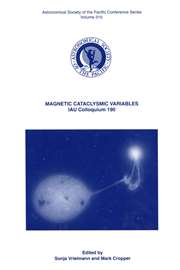No CrossRef data available.
Article contents
Limits on the Magnetic Flux of a Pre-Main Sequence Star
Published online by Cambridge University Press: 12 April 2016
Abstract
We attempt to detect a magnetic field on the weak T Tauri star, TAP35, via the enhanced equivalent widths of Zeeman-broadened absorption lines. We synthesize 25 Fe I lines, having a range of Zeeman sensitivities, using an LTE Stokes line-transfer calculation. The oscillator strengths of all lines are empirically determined a priori using the same line-transfer code applied to the spectrum of the magnetically quiet star, τ Ceti. The Fe abundance of TAP35 was established by synthesizing lines that are insensitive to Zeeman splitting. We find that the equivalent widths, Weq, of Zeeman-sensitive lines in TAP35 are systematically enhanced relative to the Zeeman-insensitive lines, consistent with the presence of widespread, kilogauss fields. The excess Weq can be explained by a product of field strength and surface filling factor (Bf) of 1 kiloGauss. A strong upper limit can be placed on the product of those two quantities, Bf < 2 kG. This measurement bears on the physics of T Tauri coronae, chromospheres, dynamos, and accretion-disk boundary layers.
- Type
- Part IV Stellar activity
- Information
- Copyright
- Copyright © Springer-Verlag 1991


